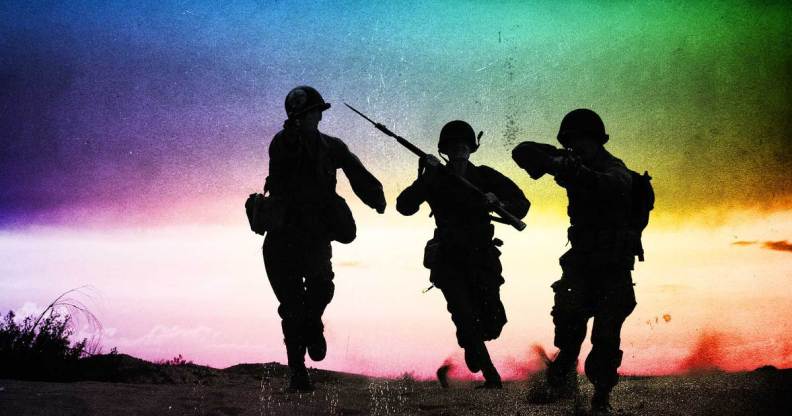Military veterans, discharged for being gay, demand apology from prime minister

LGBTQ+ veterans can now apply for up to £70,000 in compensation (PinkNews)
LGBTQ+ veterans can now apply for up to £70,000 in compensation (PinkNews)
LGBTQ+ veterans have renewed calls on the prime minister to apologise for their treatment under the military’s gay ban which saw them dismissed, abused and denied their pensions.
Until the year 2000, the British armed forces employed a ban which made it illegal for LGBTQ+ people to serve in any arm of the military.
Those “found out”, or simply suspected of being queer, faced being dishonourably discharged, abused and left with a lifetime of financial and mental anguish.
The abuses of the ban included physical and sexual assault, so-called conversion therapy, blackmail and being outed to their families.
An independent review, ordered by ministers and chaired by openly gay crossbench peer Baron Etherton, into the treatment of LGBTQ+ veterans between 1967 and 2000, was recently completed. However, the government has yet to publish the findings or officially apologise for the harsh treatment of LGBTQ+ veterans.
This has led to concern that the review will be swept under the carpet.
It is believed that about 5,000 former military personnel were affected by the ban – although some media quote a much higher figure.
LGBTQ+ veterans have now renewed calls for Rishi Sunak to issue an apology, saying the matter is “really important” and means a great deal to those who still suffer the effects of the ban.
Speaking to the BBC, one former Royal Air Force painter and finisher, who worked on Nimrod aircraft at RAF Kinloss, in the north of Scotland, said she was unaware she was gay when she joined the military in 1986, aged 19.
“I didn’t have any relationships with men or women at that time. I was sport mad,” the anonymous veteran said.
Her first experience of coming out was while being interrogated by military police in 1991, when she was questioned for hours over a period of days before breaking down and admitted she was gay.
Despite being recommended for a promotion and having an “exemplary record”, she was discharged from the RAF with a certificate that stated her “potential was marred only by her sexuality”.
She said: “It was going to be a career for the rest of my life as I saw it at the time. This happened to many, many people and it needs to be out there.”
‘For me it’s very important and it means a lot’
Another veteran told the BBC he was beaten up in the 1970s, with one of his attackers wearing steel toecap boots which inflicted a “lot of damage” on him.
Tony Sargeant, from Ossett in West Yorkshire, did not realise he was attracted to men until he joined the army. “I hadn’t been very good at school, I didn’t have many qualifications and I wanted a life that I could be proud of,” he said.
“I had no inclination as to my sexuality, but once I was in contact with other men, I realised I had an attraction to them.”
Sergeant’s career was cut short when he was found guilty of gross indecency and he served 112 days in a military prison.
He was subsequently cleared on appeal and transferred to another camp, where news of his charge travelled with him and resulted in the attack.
The ex-soldier said it would mean a lot to him if the prime minister was to apologise on behalf of the country. “It’s just someone saying sorry, but for me it’s very important.”
Caroline Paige joined the RAF in 1980 and became the first transgender officer to serve openly in the country’s military.
She now works with Fighting with Pride to campaign on behalf of LGBTQ+ veterans who were affected by the ban.
Also speaking to the BBC, Page said a “meaningful” apology from the “top” is “really important because that will impact everybody”.
A government spokesperson said: “We are proud of our LGBT veterans and grateful for their service in defence of our nation.
“The treatment of LGBT serving personnel pre-2000 was wholly unacceptable and does not reflect today’s armed forces. We can confirm that Lord Etherton has concluded his independent review and submitted his report to the government.
“We are carefully considering the findings and will respond in due course.”
During a recent House of Commons debate on the review, Labour MP Dan Carden said 1,155 veterans, serving personnel, families and professionals gave evidence, “reliving their darkest days”.
He went on: “For those who lived lives blighted by the historic ban on homosexuality in the armed forces, they now wait, as they have waited for decades, to hear their fate.”

